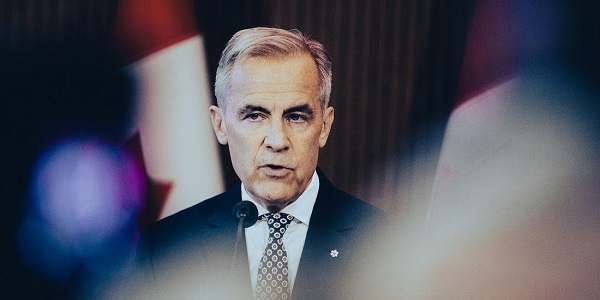National
Democracy Watch Blows the Whistle on Carney’s Ethics Sham

 Dan Knight
Dan Knight
Watchdog Group Exposes “Loophole-Filled, Unethical Smokescreens” in Prime Minister’s Blind Trust and Conflict Screen, Calls for Full Divestment
So here’s something the media doesn’t want to talk about because it shatters the entire illusion they’ve built around the man they now call Prime Minister: Mark Carney. The technocratic savior, the former banker with all the right globalist credentials, the guy who jets between Davos and Ottawa with a PowerPoint and a carbon tax. And yet, today buried under polite headlines and careful euphemisms a watchdog group in Canada finally said what should’ve been obvious to anyone paying attention.
Mark Carney’s ethics screen and his so-called “blind trust” are scams. Period.
That’s not hyperbole. That’s from Democracy Watch, one of the last remaining ethics organizations in the country that hasn’t been swallowed by the federal funding machine or bullied into silence by the PMO. In a statement released this week, they laid out—point by point—how Carney’s financial arrangement is not just flawed, but a “loophole-filled, unethical smokescreen.” Their words. And they’re right.
Let’s go through it.
Carney, who now controls the federal government, holds investments in over 550 companies. Five hundred and fifty. That includes stock options in Brookfield Asset Management, where he used to be vice-chair, and a major stake in Stripe, the Silicon Valley payment processor. Yet we’re told, by government and press alike, that all is well because he’s placed these assets in a “blind trust.” Sounds reassuring, doesn’t it?
But here’s the problem. It’s not blind. Not even close.
According to Democracy Watch, Carney knows exactly what’s in that trust. Why? Because he put the assets in himself, he chose his own trustee, and he was allowed to instruct the trustee not to sell anything. Read that again. He told the trustee: keep my investments intact. And that trustee? Free to give him updates.
So, what part of this is blind?
The answer is: none of it. And it gets worse. Carney holds stock options in Brookfield Corporation and Brookfield Asset Management—options that he cannot sell for years. Which means even if he wanted to claim ignorance, he can’t. He knows he owns them. Everyone knows he owns them. And now he’s making policy decisions that shape the very industries those companies operate in—climate policy, tech investment, financial regulation, you name it.
Let’s call this what it is. It’s a conflict of interest so massive it makes Justin Trudeau’s WE Charity scandal look like a lemonade stand. And yet, this isn’t even the worst part.
Carney’s ethics screen, the list of 103 companies he’s supposedly recused from dealing with—doesn’t cover the full 550+. It only applies to a fraction. But even among those 103, the federal Conflict of Interest Act contains a loophole so big you could drive a solar-powered Brookfield wind turbine through it.
It’s called the “general application” exemption. Under this clause, public office holders like, say, the Prime Minister; can fully participate in decisions that impact industries or economic sectors as a whole, so long as those decisions aren’t “targeted” at a specific company. So if Carney signs off on a $10 billion green tech fund that pumps value into Brookfield’s renewables portfolio? That’s legal. Because it’s general.
In fact, according to Democracy Watch, that loophole applies to “99% of the decisions” cabinet ministers make. So despite having personal investments tied to hundreds of companies, Carney can still sit in meetings, shape policy, and direct subsidies that increase the value of his trust, without technically breaking the rules.
Lets call this what it is, this is legalized insider dealing.
And remember this: every time a public official recuses themselves, they’re supposed to make a public declaration. That’s the law under Section 25(1) of the Conflict of Interest Act. But former Ethics Commissioner Mary Dawson—remember her?—helped invent a system of “ethics screens” that lets politicians bypass that requirement.
Set up a screen, tell the public you’re recused from everything, then quietly participate in decisions behind closed doors. No disclosure. No accountability. No paper trail.
Justice Parker, way back in 1987, warned us about this. In his landmark commission on conflicts of interest, he recommended banning blind trusts outright and requiring all top officials to sell their private investments. Why? Because it’s the only way to guarantee integrity. You cannot serve the public while holding shares in private companies that rise or fall based on your decisions. Period.
And yet here we are. The new Prime Minister. Over 550 investments. A fake blind trust. A self-policed ethics screen. And a legal loophole so wide open, it makes lobbying look quaint.
Now here’s the part no one will say out loud: this system is designed to be abused. It’s not broken. It’s working exactly as intended. The people writing the rules are the same ones benefiting from them. And Carney? He’s not breaking norms—he is the norm.
Democracy Watch is right. The only solution is for Carney to sell his investments, including his Brookfield stock options. End the charade. Choose public service over private profit. But he won’t. And the reason is simple: the swamp doesn’t drain itself.
This isn’t transparency. This isn’t accountability. This is how the ruling class launders power through legal technicalities, and then has the audacity to lecture you about ethics.
And if you still believe that a man who used to run a trillion-dollar fund, who sits on hundreds of corporate stakes, who appointed his own ethics babysitter and told them not to sell anything—that this man is governing in your interest?
Then I’ve got a “blind” trust to sell you.
Censorship Industrial Complex
Pro-freedom group warns Liberal bill could secretly cut off Canadians’ internet access

From LifeSiteNews
“The minister could order this dissident’s internet and phone services be cut off and require that decision remain secret”
Free speech advocates have warned that the Liberals’ cybersecurity bill would allow them to block any individual’s internet access by secret order.
During an October 30 Public Safety committee meeting in the House of Commons, Canadian Constitution Foundation (CCF) counsel Josh Dehaas called for Liberals to rewrite Bill C-8, which would allow the government to secretly cut off Canadians access to the internet to mediate “any threat” to the telecommunications system.
“It is dangerous to civil liberties to allow the minister the power to cut off individual Canadians without proper due process and keep that secret,” Dehaas testified.
“Consider for example a protestor who the minister believes ‘may’ engage in a distributed denial of service attack, which is a common form of civil disobedience employed by political activists,” he warned.
“The minister could order this dissident’s internet and phone services be cut off and require that decision remain secret,” Dehaas continued, adding that the legislation does not require the government to obtain a warrant.
In response, Liberal MP Marianne Dandurand claimed that the legislation is aimed to protect the government form cyberattacks, not to limit freedom of speech. However, Dehaas pointed out that the vague phrasing of the legislation allows Liberals to censor Canadians to counter “any threat” to the telecommunications system.
Bill C-8, which is now in its second reading in the House of Commons, was introduced in June by Minister of Public Safety Gary Anandasangaree and contains a provision in which the federal government could stop “any specified person” from accessing the internet.
The federal government under Prime Minister Mark Carney claims that the bill is a way to stop “unprecedented cyber-threats.”
The bill, as written, claims that the government would need the power to cut someone off from the internet, as it could be “necessary to do so to secure the Canadian telecommunications system against any threat, including that of interference, manipulation, disruption, or degradation.”
Many Canadians, including Conservative MPs and freedom groups, have condemned the legislation, along with several other new Liberal bills which aim to censor internet content as well as go after people’s ability to speak their minds.
“Experts and civil society have warned that the legislation would confer ministerial powers that could be used to deliberately or inadvertently compromise the security of encryption standards within telecommunications networks that people, governments, and businesses across Canada rely upon, every day,” the Canadian Civil Liberties Association wrote in a recent press release.
Similarly, Canada’s own intelligence commissioner has warned that the bill, if passed as is, could potentially be unconstitutional, as it would allow for warrantless seizure of a person’s sensitive information.
Automotive
Canada’s EV experiment has FAILED

By Dan McTeague
The government’s attempt to force Canadians to buy EVs by gambling away billions of tax dollars and imposing an EV mandate has been an abject failure.
GM and Stellantis are the latest companies to back track on their EV plans in Canada despite receiving billions in handouts from Canadian taxpayers.
Dan McTeague explains in his latest video.
-

 Business1 day ago
Business1 day agoTrans Mountain executive says it’s time to fix the system, expand access, and think like a nation builder
-

 International1 day ago
International1 day agoBiden’s Autopen Orders declared “null and void”
-

 MAiD1 day ago
MAiD1 day agoStudy promotes liver transplants from Canadian euthanasia victims
-

 Business1 day ago
Business1 day agoCanada has given $109 million to Communist China for ‘sustainable development’ since 2015
-

 Internet1 day ago
Internet1 day agoMusk launches Grokipedia to break Wikipedia’s information monopoly
-

 Business1 day ago
Business1 day agoCanada’s combative trade tactics are backfiring
-

 Automotive1 day ago
Automotive1 day agoCarney’s Budget Risks Another Costly EV Bet
-

 Business1 day ago
Business1 day agoYou Won’t Believe What Canada’s Embassy in Brazil Has Been Up To








